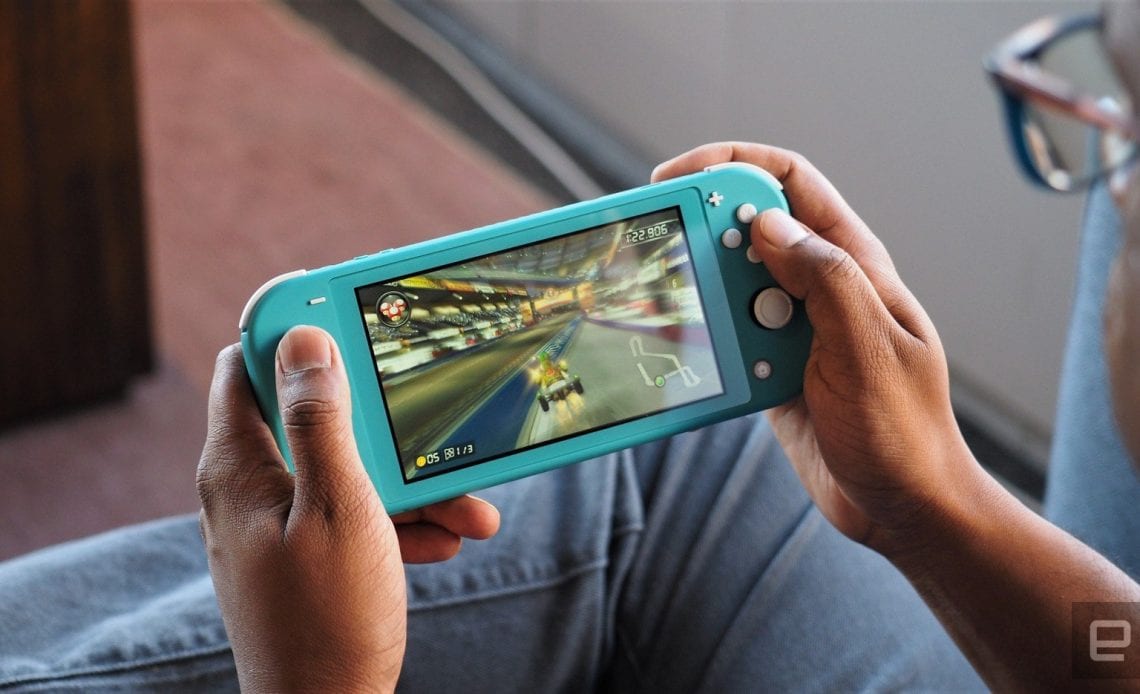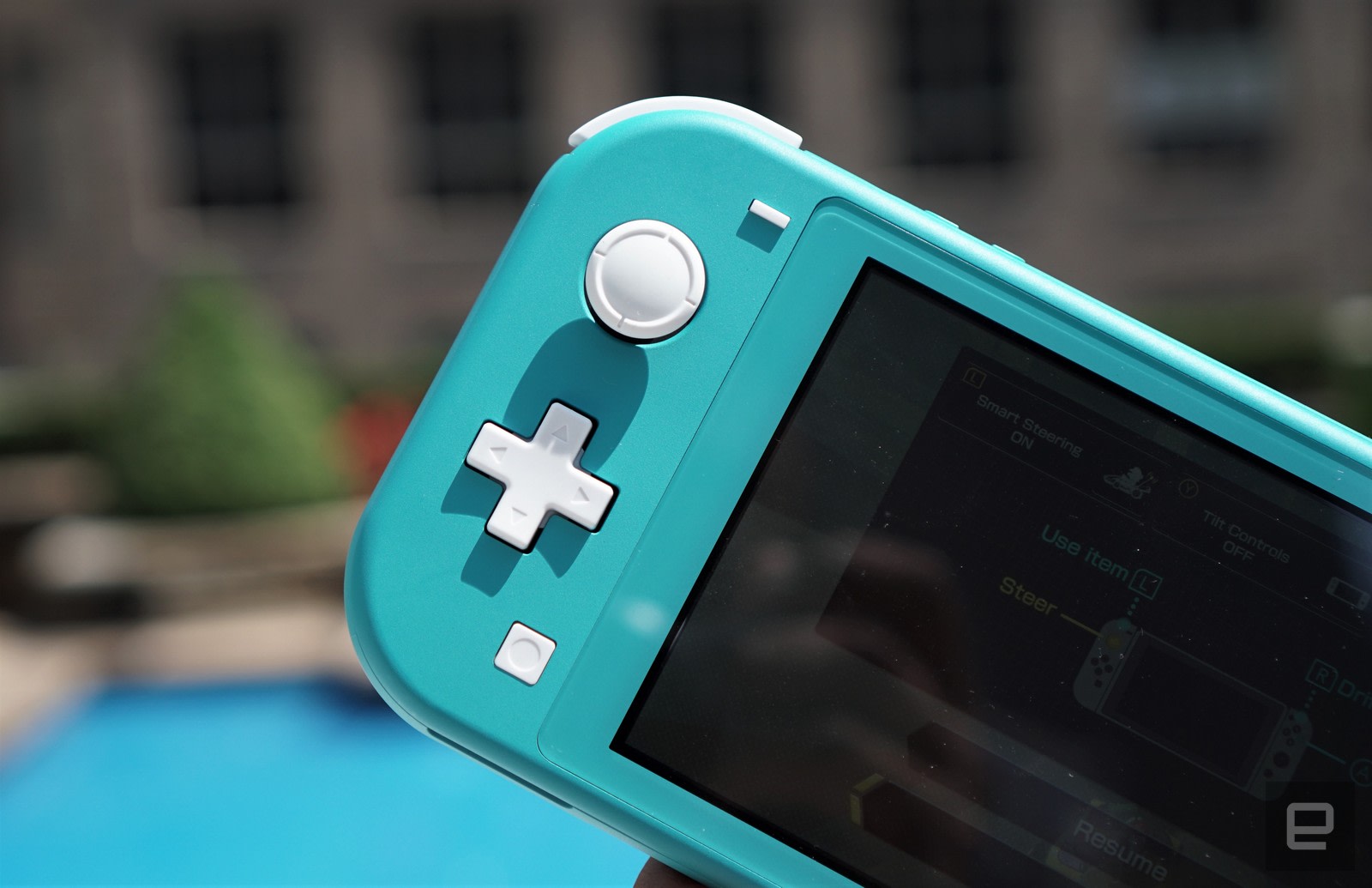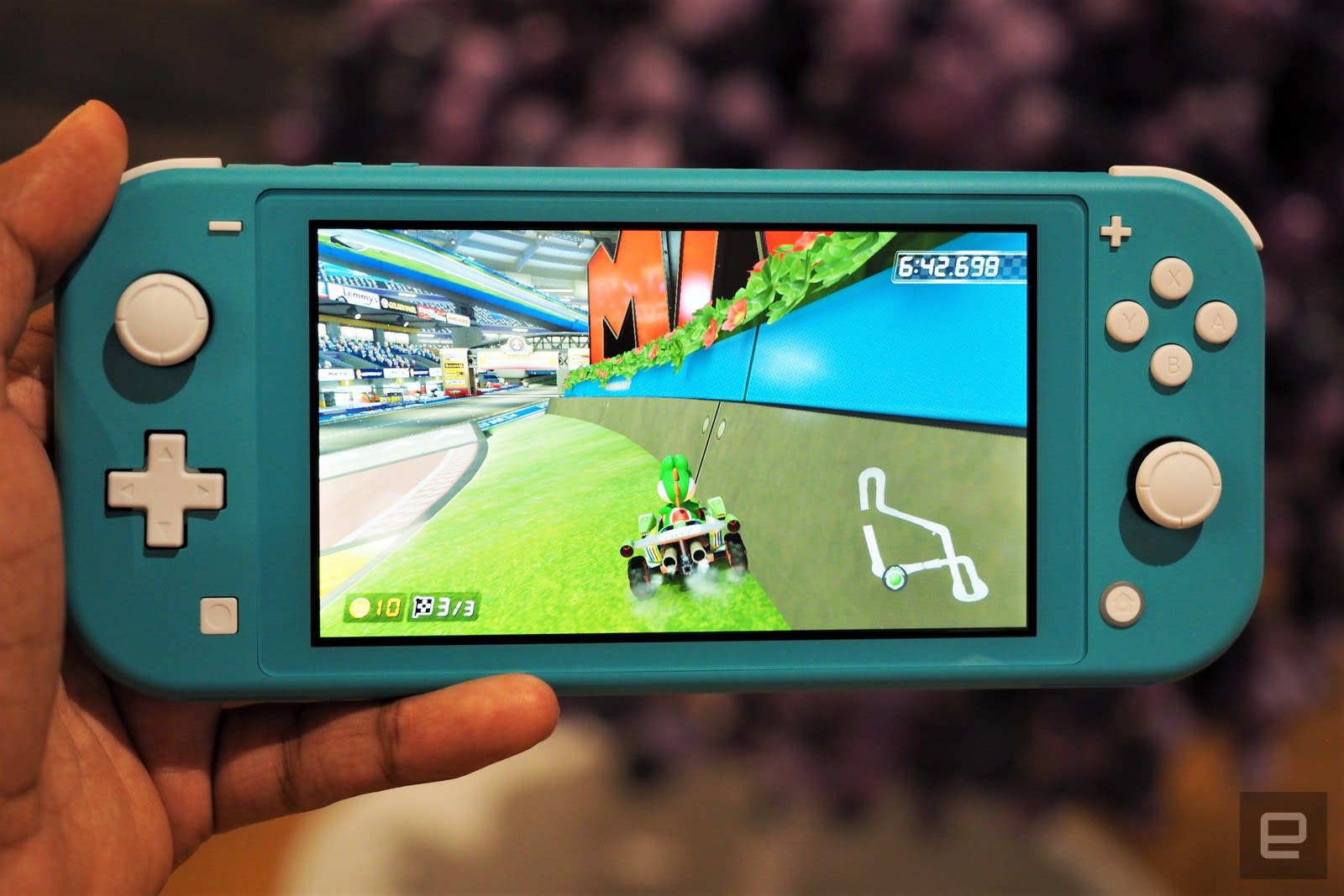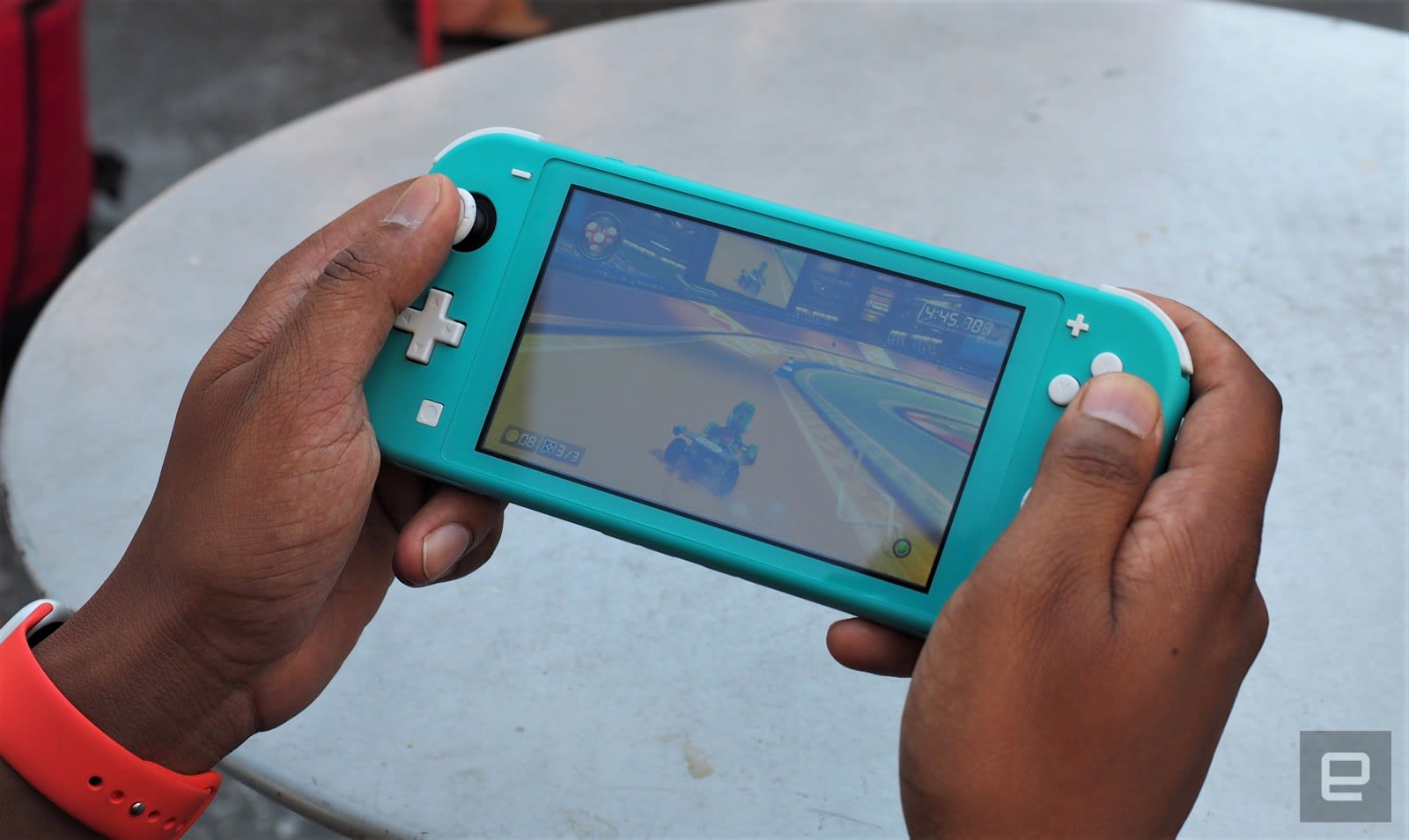
The Switch Lite is for everyone who found the original Switch too big. Really, that’s it. By going with a smaller screen and fixed controllers, Nintendo has crafted something that feels more like a genuine portable console. The Switch Lite is significantly lighter and more comfortable to hold, it can finally fit into your pocket and, at $200, it’s $100 less than the Switch. The major downside: There’s no more support for TV output. The Switch Lite is purely focused on portability, but I don’t think many gamers will mind.
If you couldn’t tell from my hands on — where I dubbed the Switch Lite the cutest console we’ve ever seen — it’s an adorable piece of hardware. The brighter colors, slimmer size and light weight make it almost seem like a Funko Pop version of the Switch. Your hands naturally gravitate towards it, like it’s a puppy begging to be pet. And once you hold it, it’s hard to let go.
It’s clear that Nintendo wanted to make something that addressed the major downsides of the Switch. While that machine was revolutionary for being able to hop between home console and portable modes, it wasn’t really optimized for either. As a handheld, it’s heavy and far too wide, thanks to an abundance of bezel around its large 6.2-inch screen. Its Joy-Con controllers aren’t securely attached, since they also need to be easily removed. The original Switch feels like Nintendo awkwardly slapped controllers on a tablet, while the Switch Lite is more like a smartphone with controllers ergonomically optimized for its smaller size. When it comes to gaming on the go, I far prefer the latter.
After playing a few rounds of Mario Kart, I noticed that the Switch Lite feels significantly sturdier than its bigger sibling. Those permanently attached controllers go a long way towards making the entire device feel solid. And of course, I didn’t have the low-level anxiety of worrying about Joy-Cons flying off if I dropped it (something that happened often with my Switch).
Nintendo was also able to make the Switch Lite smaller by using a 5.5-inch display, instead of the big Switch’s 6.2-inch screen. They’re both 720p displays, but the smaller size technically makes the Switch Lite a bit sharper when it comes to pixel density. At first, I was worried that the smaller screen would make games less immersive, but I had no trouble diving into long Breath of the Wild and Fire Emblem Three Houses play sessions. The screen itself looks just as bright as the original Switch, though it’s still tough to see in direct sunlight. And its smaller size makes tiny text a pain. Zelda’s item descriptions were already hard to read on the Switch, and you’ll really have to squint to see them on the Lite. In the name of accessibility alone, it’d be nice to see developers offer font scaling options, moving forward.
The Switch Lite controls similarly to the original: The two joysticks still feel fast and fluid, the four buttons on the face are still a bit too small and stiff and the triggers and top buttons are even more comfortable, since they’re on a smaller case. The major difference is the directional pad, which is sure to delight fans of classic 2D games. It’s smooth, accurate and simply fun to use. While it’s not as superb as the SNES controller’s while playing Super Mario World, it’s certainly miles ahead of the four-button setup from the Switch, which was so bad I was forced to replace it with a third-party Joy-Con that had a real D-pad.
The more I used the Switch Lite, the clearer it became that Nintendo sacrificed usability to make the original Switch a do-it-all console. Its Joy-Cons were designed to be used as standalone controllers so you could use them for quick two-player matches. But, to be honest, I can’t recall if I’ve ever actually done that. Alas, the dreams of rooftop Switch parties from Nintendo’s iconic launch video were a lie. At the very least, I hope Nintendo makes its own alternative Joy-Con with a true directional pad. The Switch Lite (and yes, the Switch Pro Controller) proves it still knows how to make them.
Using the Switch Lite as a secondary console was easier than I expected. While adding a new user, I just had to sign into my Nintendo Account and re-download my games. My cloud saves via Switch Online didn’t come over automatically, though. I had to manually download those in the settings. I suppose this makes sense, since you might not want to have data for older games clogging up your precious storage, but it would have been nice to get some alerts from Nintendo.
You’ll also have to be careful about syncing saved data between your consoles. The Switch Lite reliably uploaded my saves to the cloud. But when I tried to play those games on my original Switch, I got a warning about a conflict, and I had to manually download the Switch Lite file to keep playing. It’s an annoying process to deal with, but it’s something Xbox One and PlayStation 4 owners will also encounter with multiple systems.
I didn’t notice any major performance differences with the Switch Lite — it has the same hardware as the revamped Switch — but I was surprised to find myself using it much differently. It was easier to pull out and play on a crowded subway, mainly because I could hold my elbows in close without disturbing anyone. Its 0.6-pound weight also makes it easier to carry around all day, compared to the 0.88-pound Switch. Those numbers might not seem significant as you read them, but in your hand it’s instantly noticeable. I found myself grabbing the Switch Lite to play far more often throughout the day, simply because it feels like less of a burden.
It didn’t take me long to fill up the system’s 32GB of memory, but once again, there’s a microSD card for additional storage. Given how big Switch games are getting — Skyrim takes up 13GB and LA Noire eats up 27.4GB — getting a microSD card isn’t optional. But at least they’re getting cheaper these days. SanDisk’s Switch-branded 128GB card costs just $26.
While playing Mario Kart 8 Deluxe, hopping around the Nintendo eShop and downloading games, the Switch Lite lasted 4 hours and 15 minutes. Similar gameplay sessions on the original Switch typically last me around 3.5 hours. Of course, this isn’t a scientific comparison, but I definitely noticed that the battery life ticked down slower than usual. It’s also worth noting that power usage depends on the types of games you’re playing. Nintendo claims the Switch Lite will last between 3 to 7 hours, compared to estimates of 2.5 to 6 hours on the Switch. The newly refreshed version of the Switch, meanwhile, gets between 4.5 to 9 hours.
So, should you get the Switch Lite? For newcomers, it’s the ideal option if you never plan to play on a TV, or if you’re looking for something sturdier for younger players. But if you ever want to play games on the big screen, your only choice is to go with the larger revamped Switch.
The options are tougher for existing owners. You could snag a Switch Lite as a secondary console and leave the original permanently attached to your TV. Or you could just trade in your current console for the new version with battery life. And if you can hold out to next year, you might be able to snag the rumored premium Switch. I wouldn’t be surprised if Nintendo manages to squeeze better hardware, a larger battery and an improved screen into a pricier model.
At first, I thought the Switch Lite was similar to the 2DS — a stripped down, kid-friendly version of a more technically complex console. But that might be dismissive of what Nintendo has actually accomplished. The Switch Lite is refined and ergonomic in a way I’d never think of the 2DS. It might be missing key aspects of the Switch experience, but it’s also the best way to play Switch games on the go.
Author: Devindra Hardawar
Source: Engadget






